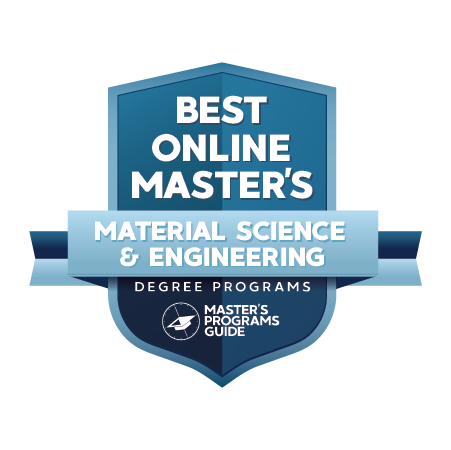Ready to find your ideal master's program?
www.mastersprogramsguide.com is an advertising-supported site. Featured or trusted partner programs and all school search, finder, or match results are for schools that compensate us. This compensation does not influence our school rankings, resource guides, or other editorially-independent information published on this site.
The world is evolving, and so are our capabilities. From nanotechnology to forensic engineering, materials science—the study and design of materials, mostly solids—is our door to the future. It’s our ticket to a longer, more convenient, sustainable, and efficient life. How can we be so sure? Well, because, in a broad sense, it’s taken us to where we are now.
How, you may ask? Isn’t materials science and engineering a relatively new field? Sure, in a way. Universities haven’t been teaching materials science and engineering for long. But science isn’t a modern development—it’s billions of years old. The only somewhat new thing is the organized, scholarly community that surrounds science. This brings us to the 10 Best Online Master’s in Materials Science and Engineering, but first, let’s go back in time.
Here’s an old example that illustrates the history and importance of materials science. Over 5,000 years ago, by accident or by design, a mixture of copper and tin ores melted in a pottery kiln. What came out of the furnace was neither copper nor tin—it was bronze. And, suddenly, humans were able to forge weapons, pots, statues, knives, and axes.
Think about an ax for a moment. With a hatchet, felling a tree is simple, if strenuous. What, though, is an ax? Usually, it’s a metal head connected to a wooden handle. But how do you combine the two? Well, while our ancestors were creating the first writing system, they also discovered composite materials like fibers and resins. This breakthrough is one of the most important developments in materials science, ever. With resins and fibers, humans were able to attach blades to sticks, and a whole lot more.
The Industrial Revolution began around 4700 years after the advent of the bronze age. This transitional time saw machines replace our hands, new iron production processes, and the chemical manufacturing industry. All these things, as you may guess, make up materials science and engineering. Because of the developments of scientists and engineers, cities saw unprecedented growth in the Industrial Revolution. Additionally, for the first time, the standard of living for the general population in the western world increased steadily.
Enough with history; let’s look at a few things materials science is doing now. With nanotechnology, humans are manipulating materials on an atomic, molecular, and supramolecular scale. They’re forging nanomedicine, nanoelectronics, and biomaterials that will inform and shape our future. Some of these applications are morally ambiguous. Other applications, like water filter design, are vitally important.
Not too long ago, scientists developed ultra-pure silicon for high-frequency radar receivers in the Second World War. By experimentation, scientists discovered the importance of ultra-pure silicon for modern electronics, including computer processor chips.
Materials science and engineering (MSE) is a fascinating field. It’s complicated but also rewarding and critical to our future. Do you want to influence and improve our health and medicines? Would you like to play a role in creating an environmentally friendly future? Whether you want to find sustainable materials or design the next best technology, materials science and engineering offers a path for you.
See Also: 10 Best Master’s in Industrial Engineering
Common Application and Admission Questions
Are you ready to get your master’s in MSE? The application process itself is a little tedious, but doable. However, it certainly depends on the school. In this section, we’ll give you a rundown of typical application requirements and answer frequently asked questions.
To get into a graduate MSE program, you need to have graduated from university with a bachelor’s or equivalent degree. While there may be a few exceptions to this rule, your chances of admittance drop drastically without a degree. And because the MSE coursework begins at an advanced level, most schools will expect you to have a bachelor’s degree in an engineering discipline, mathematics, or physics.
You will also most likely need two or three letters of recommendation. Some universities allow employers to write letters of recommendation, but, typically, graduate programs will want to hear from your undergraduate professors. Sometimes, it’s intimidating to ask professors for a recommendation, but don’t worry. Just email a few professors stating who you are, why you need a recommendation, and why you feel you deserve it; they’re usually happy to help.
Additionally, most MSE graduate programs will ask you to submit your GRE test scores. If you haven’t taken the GRE yet, and you’re not in any rush to apply for schools, consider taking a GRE prep course. The test is challenging, and without proper preparation, you may not love your final score.
Furthermore, many graduate MSE programs expect your undergraduate GPA to be 3.0, a B average, on a scale of 4.0. If you’re slightly below that line or at the threshold, you may be able to compensate with strong test scores, fantastic letters of recommendation, and strong grades in relevant courses.
What are your chances of getting into your desired MSE program? It depends on the school and your application portfolio. As long as your GPA, test scores, letters of recommendation, and application essays are strong, you should be a lock for most programs. Make your ambitions clear, and be as specific as possible on the application. Graduate programs have a far higher acceptance rate than undergraduate programs. For example, UCLA accepts around 55% of graduate MSE applications, but only 20% of undergraduates.
Additionally, most graduate schools have an application fee hovering around $100. This fee is usually mandatory, although some programs may be able to waive your payment if you have a strong reason. Instead of considering the charge a burden, treat it as an investment. By applying and entering a graduate MSE program, you’re investing in an excellent education that will increase your knowledge and enhance your career opportunities.
Lastly, some people don’t want the word “online” to be visible on their transcript. Although many online classes are as good as their respective in-person classes, this concern is understandable. Thankfully, most online MSE programs won’t list your degree as an online degree. They’ll simply state your coursework and “Master of Science in Engineering – (Your Major).”
See Also: Best Master’s in Materials Science and Engineering
What About Financial Aid & Scholarships?
If we know one thing, it’s that graduate school is expensive. We also know that student loans are crippling. We’d argue that, when it comes to lucrative professions like MSE, it’s worth going in debt to increase your qualifications. Still, though, why not save a dollar or, say, several thousand dollars when you can? Consider applying for the following scholarships. Although they’re competitive, we promise it’s worth a try.
The Minerals, Metals, and Materials Society (TMS) offers generous scholarships to graduate and undergraduate students pursuing MSE. As their mission statement suggests, they’re an ambitious group: “TMS aspires to be the society that envisions, defines, and enables the future by gathering and empowering materials experts to scope the future of materials science, engineering, and technology.” They offer many types of financial help, including toward TMS symposiums, events, and your graduate degree. If your aspirations line up with theirs, and you can prove it, consider applying for a scholarship.
The American Society for Metals International (AMS) is a non-profit organization with over 18,000 members from all around the globe. Their mission is to advance the technical development, production, and processing of irons and steel. To reach its goal, the AMS foundation offers up to 30 one-year US$6,000 scholarships, including a paid internship.
Furthermore, many of your prospective schools might offer scholarships for graduate degrees. Be sure to dig deep into your available resources before concluding there’s nothing for you. Also, many graduate schools offer or require the opportunity to be a graduate assistant, research assistant, or lab instructor. Graduate assistants help professors teach classes, while research assistants help professors and faculty conduct their research. Depending on the program, this work can either subsidize your tuition or result in a direct paycheck. You can also apply for financial aid through the Free Application for Federal Student Aid (FAFSA). Depending on yours and your family’s income, the amount of support will vary.
Lastly—this point is important, especially if you’re still an undergraduate—find an employer who will pay your tuition. This resource is incredibly useful and beneficial. Many employers, especially if your desired graduate degree is in a related field, will cover the cost of tuition. The exact terms will vary from employer to employer: some require you to have worked for the company for a certain amount of time, usually a year or more before they’ll fund your graduate work; some businesses require you to work sporadically throughout your degree; others require you to return to the company when you finish your degree. While this option is fantastic, always read the fine print before agreeing to a tuition exchange. You don’t want to exchange underemployment for a decade for free graduate tuition for a year, do you?
See Also: Best Online Masters in Chemical Engineering
How Much Can I Make With a Master’s in Materials Science and Engineering?
A master’s in materials science and engineering is a versatile degree. With it, you can develop, process, and test a variety of materials. But because the job field is so broad, there’s no single job title to search. Do you want to design computer chips or golf clubs? Do you want to test the next best biomedical device? Or how about devoting your time to research? By doing so, you can study different metals, composites, nanomaterials, ceramics, and other solids to create new materials. These materials can meet specific chemical requirements, or offer an environmental alternative to an existing product.
The point is, there are many different careers in the field, and different careers will pay you differently. Detailing each potential career would result in a full-length book, so we’re going to summarize the jobs and salaries of a few popular careers within materials science and engineering.
According to the Bureau of Labor Statistics, the median pay for materials engineers in 2018 was $92,390 per year, or $44.42 per hour. The lowest 10% earned less than $57,110, and the highest 10% earned more than $148,110. Considering that these statistics include workers with no more than a bachelor’s degree, you can expect to make more than the median pay once you’re a few years out of graduate school.
Below is a list of the five most popular job fields for materials science engineers, and their average pay:
- Workers participating in the research and development in the physical, engineering, and life sciences earn an average of $107,840 per year
- Engineers working in transportation equipment manufacturing earn an average of $100,030 per year
- Engineers working in computer and electronic product manufacturing earn an average of $94,020 per year
- MSE graduates working in engineering services earn an average of $90,630 per year
- Materials scientists working in primary metal manufacturing earn an average of $81,170 per year.
As you can see, materials science and engineering is a lucrative career. It’s fulfilling, too, especially if you’re researching new, innovative, and environmental materials. Below are several materials science job titles, and their respective work.
- Composites engineers develop materials that are designed for automotive and aircraft applications
- Ceramic engineers develop ceramic materials, from rocket nozzles to glass
- Plastics engineers develop, design, and test plastics for new applications
- Metallurgical engineers work with metals, sometimes in combination with other materials.
Many professions are experimenting with a 30-hour workweek and remote work. Materials science and engineering careers, however, are usually full-time 9-5 jobs. And given the nature of the work, there is very little space for remote work, although there might be travel involved in your position.
What Are the Best Online Master’s in Material Science and Engineering Degrees?
We know that you have educational goals that you’re itching to pursue, but you may not know where to start. The editors of Master’s Programs Guide utilize a unique ranking methodology based on the following five aspects:
25% Overall Degree Affordability: Average cost of undergraduate and graduate tuition per school
25% Graduation Rate: Number of students who start at the university and actually finish there
20% Earnings Potential: Average mid-career salary of school alumni
20% Selectivity: The number of students who apply versus the number who actually get accepted
10% Online Graduate Offerings: The number of programs offered online in each department
At Master’s Programs Guide, we strive to do our best to guide you and your family toward a fruitful academic career. The pursuit of knowledge is a noble one, and we want to help you reach your goals.
#1. University of Florida
Masters of Science in Materials Science and Engineering

The University of Florida is an outstanding state school. In fact, U.S. News and World Report ranks the University of Florida as the No. 34 best university in the nation. That’s behind such esteemed private Ivy League schools as Harvard, Princeton, and Yale. If you only look at public schools, the University of Florida is the seventh best in the nation. Pretty impressive, right?
Big state schools aren’t for everybody, though. Maybe you don’t want to walk among over 50,000 undergraduate students. Or perhaps that sounds fun to you, but you don’t have the time or ability to leave your home for six month stretches. That’s okay—the University of Florida offers its master’s of science in materials science and engineering as an online option.
The University’s Department of Materials Science and Engineering is part of the Herbert Wertheim College of Engineering. Both schools are highly esteemed, both nationally and internationally. Many of the department’s professors are also nationally and internationally acclaimed for their work in MSE.
The University of Florida’s online MSE program is known as the MSE EDGE program. Besides your in-class participation, though, the EDGE program and in-person program share more similarities than differences. Namely, the coursework is the same.
First, you’ll choose your track from the four available options: structural materials, polymers, electronic materials, and metals. From there, your coursework will begin. While the required and optional electives are different between each of the four tracks, the tracks share three central core classes. These classes are Material Structures & Mechanical Prop, Materials Thermodynamics, and Properties of Functional Materials. Each course is offered via streaming video, and you can download the videos to your device for offline viewing.
To graduate with a master’s in materials science and engineering, you must complete 30 credit hours. Graduate courses in the MSE graduate program include topics such as general materials science and engineering courses, as well as specialized courses on biomaterials, ceramics, composites, electronic materials, and polymers. Of these 30 credits, 18 must be from upper level EMA5000-6000 courses. For these courses to count, though, you need at least a C in each class and a B average among your EMA5000-6000 level courses.
To apply for the master’s of science in MSE, go to this page. The application process will mostly be the same, regardless of your decision to take the distance learning approach. If you want to attend the University of Florida in the fall, you must finish your application by December 15th. There is a rolling deadline for spring admissions, but the school suggests that you complete your application by November 1st.
The school offers departmental financial aid, but to receive it, you must complete your application by the deadline for admission. To be a match with the program, you should have an undergraduate degree in materials, ceramics, metallurgy, another engineering degree, mathematics, or science areas such as biology, chemistry, or physics.
#2. North Carolina State University at Raleigh
Master of Materials Science and Engineering

North Carolina State University is highly regarded far and wide for its engineering programs. The U.S. News and World Report ranks the school as the No. 84 best university in the country, with the No. 34 best undergraduate engineering program. Interestingly, North Carolina State University is a land, sea, and space-grant university. That means the school offers many unique career paths and research opportunities.
Among many other things, NC State University is known for its distance learning programs. The school offers one of the most robust collections of accredited online courses, with over 110 programs, so it is certainly no novice in the format. The online offerings range from teacher licensure and graduate certificates to doctoral and master’s degrees.
The Master of Science in Materials Science and Engineering (MMSE) degree is just one of the highly esteemed College of Engineering’s many offerings. NC State offers its MMSE degree as a non-thesis, course-only master’s degree. If you would prefer to complete a thesis, you will have to attend the program on campus.
Like the University of Florida and most other schools on this list, the coursework offered does not differ between on-campus and distance environments. The only difference is that you’ll attend class via online video lectures and exams administered by a local proctor. And you’ll be in the comfort of your own home or local coffee shop, with no need to pay extra for housing or commutes.
Throughout the MMSE program at NC State, you’ll focus on understanding the structure, modification, and properties of materials as well as the development of new or improved processing methods. Your course load will vary from mandatory classes to niche electives. Some of the class offerings are Modern Concepts in Materials Science, Nuclear Materials, Materials Science of Nanoelectronics, and Polymer Technology and Engineering.
This MMSE program is specialized, so if you don’t have experience in MSE or a similar field, you may be lost. Accordingly, North Carolina State University looks for applicants with a BS degree in Materials Science and Engineering (MSE), another field of engineering, or a related technical discipline such as chemistry or physics.
If your undergraduate degree isn’t in MSE, the institution might suggest that you take a few undergraduate-level MSE classes before continuing to the graduate program. Don’t take it as a penalty, though. While you won’t jump into your MSE classes right away, up to 12 credits of non-degree coursework can transfer toward the completion of your MMSE.
To be admitted to the program, you must have a 3.0, or B average, out of 4.0. Like the University of Florida, NC State will expect high test scores if you’re close to the threshold. Additionally, they’ll expect excellent purpose statements and letters of recommendation. Likewise, to graduate from the program, you’ll need a 3.0 or higher GPA.
#3. University of California-Los Angeles
Master of Science in Engineering—Materials Science

As public universities go, the University of California—Los Angeles, known as UCLA, definitely makes the all-star list. It is considered to be one of the nation’s “public Ivies”, on par with the private universities that make up the Ivy League. The U.S. News and World Report named UCLA America’s best public university in 2019.
UCLA is attended by more than 30,000 undergraduates and almost 13,000 graduate students. Its large size makes it a hub for a wide range of disciplines, including engineering and materials science. The university has offered an online Master of Science in Engineering degree since 2007, and the U.S. News and World Report has ranked it in the top two online graduate engineering programs many times since then.
This program is designed to give working professionals access to a graduate degree in engineering. It has been put together to maintain the same standards as coursework offered on campus. In fact, if you complete this program, no one will be able to tell from your transcript or your diploma that you did it online!
The program also helps graduate students develop close ties with big names in related industries. Many of the program’s alumni have gone on to careers with top corporations like Apple, Boeing, Raytheon, and Qualcomm.
The salaries reflect it: alumni of this program report an average mid-career salary of $127,000. While this program is on the pricier end, in-state students pay far less than students from outside California. In any case, the post-grad job opportunities definitely make up for it.
Industry connections aren’t the only thing this program offers. Students have access to dedicated professors and teaching assistants who conveniently provide support over the phone and email. They even hold “interactive problem-solving sessions” to help students better understand the course material.
Students in this program can complete all of their assignments and attend all class sessions online. Lectures are even recorded and made available for students to watch later.
The only exception is for midterms and final exams. Then, students have to go to campus or another approved testing location to take their tests. However, there are plenty of options for alternate testing locations—students can even complete exams at their workplace! This program holds students to a high standard, but it also gives them the tools they need to succeed.
The concentration in Materials Science is one of nine concentrations offered within the Master of Engineering degree. No matter the concentration, all MS in Engineering students must complete nine courses for a total of 36 units.
You can submit an application for this program for the fall semester (deadline in mid-May) or the spring semester (deadline in early December). In order to apply, you need to have an undergraduate degree in engineering, mathematics, or physics and have earned a GPA of at least 3.0.
Overall, the admissions board wants to know that you’ll succeed at graduate-level coursework. That means they may also take into consideration your work experience and your performance in other graduate school classes, if you’ve taken any. You can attend a virtual info session for this program here and start your application here—good luck!
#4. University of Central Florida
Master of Science in Materials Science and Engineering

The University of Central Florida has been known as an engineering school since it was founded. In fact, it was called Florida Technical University when it opened its doors in 1963. Since then, it has grown to include more diverse offerings—and the largest on-campus student body of any university in the United States.
UCF now operates on a number of locations outside its main Orlando campus. To keep its degrees accessible to working professionals, the university also offers high-quality online instruction, including the Master of Science in Materials Science and Engineering program.
This program prepares students to meet the demands of an ever-changing world, either as materials scientists or engineers. It is designed to take an interdisciplinary approach to this field of study. Alumni of the program have gone on to work in many different areas, including the plastics and metals industries, the automotive and aerospace industries, archaeology, and education.
Courses are taught by the same professors who teach on-campus, which reflects the value this program places on its online students. Each student is matched with a success coach who provides support from admission to graduation. This program invests heavily in its students—a real plus for anyone looking to succeed in this field.
All students in this program have to complete a core set of required courses to build a solid foundation of knowledge. However, once that work is completed, students are free to focus on their particular area of interest through elective courses.
Required courses make up half of the 30 credit hours needed to complete this program. The other half is 12 hours of electives and 3 hours of independent learning, or the optional research thesis.
This program offers both thesis- and non-thesis options. While both are designed to give students a strong set of research skills, this setup gives students the ability to shape their own educational experience and graduate ready to pursue a variety of projects related to materials science.
In-state tuition for this program is extremely affordable in comparison to similar online degrees at other universities. The price jumps quite a bit for out-of-state students. However, this program’s high-quality, personalized instruction—and the sizable average salary waiting for graduates on the other side—are worth it.
To be accepted to this program, applicants need to have a bachelor’s degree in materials science and engineering or a closely related field of study. They must also provide a resume and statement of their career and educational goals to determine if the program will be a good fit.
One plus of this application is that it does not require a GRE score, so if you haven’t gotten around to that—don’t worry! You can apply to begin during the spring (application deadline December 1), summer (deadline April 1), or fall terms (priority deadline January 15, regular deadline July 1).
#5. Johns Hopkins University
Master of Materials Science and Engineering

Johns Hopkins University is a nationally and internationally renowned university. The statistics speak for themselves: U.S. News and World Report ranks John Hopkins University as the tenth best in the nation.
Like most of its programs, the materials science and engineering program is highly esteemed. The program is based in the Whiting School of Engineering, whose faculty and curricula have shaped thousands of students over the years.
The goals of the master’s in materials science and engineering are threefold. As stated by the school itself, students will:
- Understand the basic concepts related to the structure of engineering materials.
- Understand the basic thermodynamics and kinetics of engineering materials.
- Apply the structure, thermodynamics, and kinetics of materials to the characterization of material properties and to the design of engineering materials.
Johns Hopkins University’s MMSE program is cutting edge. You will learn how to discover the properties of materials, alter materials through state-of-the-art processing techniques, and learn how to harness new materials and properties.
To be a good fit with the program, you should have an undergraduate degree in an engineering or scientific field. In addition, you should have experience in linear algebra, physics, and chemistry. These courses will provide the information you need to succeed in the program. You should also have a 3.0 or higher on a 4.0 scale. Given the competitive nature of Johns Hopkins University, the higher your GPA, the better your chances of admittance.
Without meeting each of these requirements, Johns Hopkins University may still admit you to its program. You will, however, have to complete the prerequisite programs at JHU or a regionally accredited institution.
To graduate from the master’s in materials science and engineering program, you must complete ten courses within five years. These courses include two core courses and eight electives that will reflect your focus area in the program. The two core courses are Structure and Properties of Materials, and Thermodynamics and Kinetics of Materials.
If you choose a nanotechnology concentration, your coursework will be slightly different. You will have four core courses, two of which focus on nanotechnology, and six electives. In addition to the two core courses mentioned above, you must take Introduction to Nanotechnology and Nanomaterials.
There are many potential electives that reflect each focus area and concentration in the program. Some of them are Physical Properties of Materials, Introduction to Biomechanics, Solid-State Physics, and Biochemical Sensors. Given the prestige and robust nature of Johns Hopkins University’s MSE program, you’ll have access to many fascinating classes.
Of your ten classes, only a single C grade (C-, C, or C+) can contribute to your graduate degree. Otherwise, you must have a B- or higher in each of your classes. Furthermore, up to two of your ten classes can be from the Engineering Management and/or Technical Management programs.
#6. The University of Arizona
Master of Science in Materials Science and Engineering

The University of Arizona is a public institution that was founded in 1885. While the University of Arizona is an excellent school—as good as many others on this list—it is not very selective. In fact, in 2018, it accepted 84% of its undergraduate applicants. This selection rate is in contrast to many Ivy League schools that have acceptance rates that hover around 8%. You’re not guaranteed to get into the program, but it’s a safer bet than some of the other schools listed here.
This MSE program is part of the University of Arizona’s School of Engineering. According to U.S. News and World Report, materials science and engineering is one of the top-ten paying undergraduate degrees. With a graduate degree, then, you can expect even higher pay and more prospects.
The University of Arizona offers a high-quality and customizable graduate program. If you’ve gotten this far, you probably know where you want to go, right? So why would you want to take classes you have little interest in? At the University of Arizona’s graduate problem, you can customize your curriculum according to your interests. The school offers a “signature course” elective format, which allows you to choose the courses that interest you the most.
Some of the subjects that the University of Arizona offers are microelectronic processing, ceramics and polymers, and computational materials. Whatever your desired field is, you can find all the classes you need and more within the MSE program.
For admittance to this program, you should have an undergraduate degree in a science or engineering field. Otherwise, you’ll be entirely unprepared for the program. If you graduated in an unrelated area, consider taking prerequisite courses at your local community college. It’s cheaper than a larger institution, and as respected by graduate schools.
To graduate with a Master of Science in Materials Science in Engineering, you must have a 3.0 GPA on a 4.0 scale. Also, you must complete your degree within six years of admittance. If you’ve completed graduate-level work at another institution or in the field, the university may accept up to six units of coursework that contribute to your graduation requirements.
This graduate degree sets you up for a fulfilling, financially secure career. Graduates have worked in such esteemed places as Honeywell, Raytheon, Northrop Grumman, and Boeing in the fields of aerospace and defense. Others have worked in semiconductor manufacturing at Texas Instruments, Samsung, and Intel. The point is, whatever your career prospects are, the University of Arizona’s excellent MSE program will set you up for success.
#7. University of Southern California
Master of Science in Materials Engineering

The University of Southern California hardly needs an introduction. From championship-winning sports teams to top-of-the-line science programs, USC is a world-renowned school. According to U.S. News and World Report, USC is the No. 22 best university in the nation. Additionally, the school has the ninth best engineering department in the nation. Given those two statistics, plus the fame associated with USC, the school is an excellent option for your graduate degree.
The materials engineering program belongs to the school’s famous Viterbi School of Engineering, which has produced world-renowned aeronautical engineers, materials scientists, and biomedical engineers. This program focuses on the characterization, selection, and processing of engineering materials, as well as in materials problems related to engineering design.
Given USC’s wide variety of programs related to materials science and engineering, you can work for this degree in either the Materials Science or Aerospace and Mechanical Engineering departments. Through those departments, you can focus on your professional aspirations. Do you want to design impenetrable, heat-resistant material for space shuttles? Do you want to find environmental solutions to worldwide problems? Whatever your choice is, you can find an appropriate path at the University of Southern California.
The program requires 27 units for the general MS in Materials Engineering degree. Of these units, 18 of them must be in materials science courses that the department approves. You can take the remaining nine units in elective courses that, once more, your department approves. To graduate from the program, you must have a 3.0 or higher grade point average on a 4.0 scale.
While your degree will be online, you will participate in a unique blended delivery model, allowing online students to fully engage with the on-campus classroom. That way, you’ll hardly feel removed from the classroom, able to listen to USC’s esteemed faculty and your fellow students. Additionally, you’ll be able to ask questions in real-time, just like in a traditional classroom.
To apply for this online master’s in materials science and engineering, you will need a few things: official transcripts from your university, GRE scores, your resume, a personal statement, and three letters of recommendation. Your letters of recommendation should come from people who are familiar with your academic or professional work in the field.
To increase your chances of admittance, you should have a bachelor’s degree in materials science, chemical engineering, chemistry, physics, or a related field. And because USC is a very selective school, your undergraduate GPA should be as high as possible.
According to the school, graduates of the master’s program have worked in such diverse fields as pharmaceuticals, tissue engineering, public health, combustion, petrochemicals, project delivery, minerals and environmental agencies, and many more. As you can see, this program will set you up for success in the real world, whatever your professional aspirations may be.
#8. Arizona State University-Tempe
Master of Science in Materials Science and Engineering

Arizona State University-Tempe is one of the largest schools in the nation, with over 50,000 enrolled students. Given its size, it makes sense that many students flock to its many programs, sports teams, extracurricular activities, and clubs. And it’s not surprising that the school’s Materials Science and Engineering department is full of many high-quality classes.
Arizona State University-Tempe’s MSE program was chosen as one of U.S. News and World Report’s most innovative online college offerings in 2020. The university earned that reward for a good reason—take a look at its website and curriculum, and it will all make sense.
The MSE program makes up part of the school’s Ira A. Fulton Schools of Engineering. The engineering school is gigantic—23,903 students attended the school as of the fall of 2019. The school faculty includes Nobel laureates and many engineers, materials and otherwise, who have advanced the science and scholarly research of their respective fields.
While you will trade the on-campus experience for an online, more comfortable, and economical experience, the classes itself will remain largely the same. To graduate with a Master of Science in Materials Science and Engineering, you will take courses in advanced thermodynamics, structure and mechanical properties; materials physics; and kinetics and phase transformations. These are the core classes that comprise your graduate work.
Beyond these four core topics, you can take electives according to your preferred field. Some of the electives are the Physical Chemistry of Materials, New Materials for Healthcare, Microelectronic Packaging Materials, and Materials Selection for the Environment. You can find a more extensive list of courses in this document. As with most master’s programs, you must complete the required coursework within six years to graduate. You must also maintain a GPA that is 3.0 or higher in all graduate coursework.
To enter the program, you must have an undergraduate GPA of 3.0 out of 4.0 in the last two years of your undergraduate degree. If you didn’t graduate from an ABET-accredited program, you must have an undergraduate GPA of 3.5 and a 156 or higher score on the quantitative section of the GRE general test.
You must also provide your official undergraduate transcript, three letters of recommendation, a statement of purpose, and your resume. These requirements are standard for graduate schools. As always, make sure that your application is as strong as possible. If you struggle in one area, such as your GPA or GRE scores, compensate with excellent letters of recommendation or an experience-laden resume.
#9. Purdue University
Master’s in Materials Engineering

Purdue University is a large, public research university in West Lafayette, Indiana. Among many other accomplishments, Purdue has 25 American astronauts as alumni and faculty. It’s an excellent school, highly esteemed for its science and engineering programs. You may have heard of some of Purdue’s alumni and faculty members: Neil Armstrong, Orville Redenbacher, Gary Payton, and Jim Gaffigan.
Purdue University’s MSE program emphasizes the “application of the basic sciences to the understanding of the structure, properties, and processing of materials.” Your coursework will build on your existing knowledge, driving you closer to your aspirations as a materials engineer. Given Purdue’s reputation as an excellent engineering school, it isn’t surprising that U.S. News and World Report ranks this online program in the top ten nationwide.
The online master’s in materials engineering degree is a 30 credit hour online concentration packed in Purdue’s Interdisciplinary Engineering (MSE/MS) degree. As a master’s student, you will concentrate on technical knowledge and advanced materials topics. Unlike many online degree options, Purdue offers both thesis and non-thesis options.
To reach your 30-credit requirement for graduation, you will take classes in materials fatigue, composites, biomaterials, and materials engineering fundamentals. Some of the courses you might take are Steel and Aluminum: Processing Structure and Properties, Materials Engineering Fundamentals, and Introduction to Biomaterials.
As a graduate student, you can join one of the graduate school’s clubs or research efforts from afar. Purdue is consistently on the front lines of graduate research, especially when it comes to engineering and the sciences. Some of Purdue’s recent research efforts concern ceramic–metal composites for heat exchangers in concentrated solar power plants, which optimize an already environmental technology.
Again, Purdue’s faculty is filled with forward thinkers. As you learn online, you’ll have teachers who have conducted state-of-the-art research, collaborating with faculty from Purdue’s Pharmacy, Electrical and Computer Engineering, Biomedical Engineering, Aero/Astro Engineering, Chemical Engineering, and Industrial Engineering schools.
To apply for the school, you must submit a diversity essay, resume, statement of purpose, three letters of recommendation, official transcripts, and a GRE. While there is no minimum GRE score required for admittance, the average score for admitted students is 160. It is suggested that your undergraduate GPA is 3.0 or higher.
Your undergraduate degree should be in materials science, engineering, physics, or a related science. And the more similar your resume is to materials science, the better. Admission professionals don’t emphasize any of these factors above all others—your overall image, based on each of the admission requirements, should be strong. As long as you’re a passionate materials science or engineer, and you have the materials to prove it, you’ll be an excellent fit for this program.
#10. Columbia University
Materials Science and Engineering Master’s Degree

You’ve probably heard of Columbia University. It’s part of the prestigious Ivy League and one of the country’s oldest universities. But did you know that Columbia has been offering online degrees since 1986? That’s way ahead of most of its competitors, so Columbia has had plenty of time to refine its approach to online coursework.
The online master’s degree in materials science and engineering is part of the Fu Foundation School of Engineering and Applied Sciences at Columbia. It is designed to give both full-time working professionals and students living in remote locations access to graduate coursework at a world-class university.
The program prepares students to work at the cutting edge of the engineering world and emphasizes technical literacy to help them get there. Students work alongside some of the world’s foremost engineering researchers and educators, and the coursework challenges them to engage with the newest innovative technologies.
Although the program is academically rigorous, it offers students a wide variety of ways to pursue their graduate-level education. In addition to a traditional master’s degree, Columbia offers non-degree and certificate online programs in engineering, which may be of interest if you are hoping to continue your studies but are worried about the time commitment or financial burden of a full master’s degree program.
Another unique option offered by this program is a professional metallurgical engineer degree. This option is appropriate for engineers who wish to continue their studies beyond the level of the MS degree but don’t want to focus on research.
Engineers who opt for a master’s degree in materials science and engineering will work closely with a faculty mentor throughout the program. These mentors help students formulate a plan of study that matches students with elective courses according to the student’s goals and interests.
This program requires students to complete 30 credits in order to graduate. 18 of those credits are required courses, and students must take at least two of the required courses during their first semester. All enrolled engineers must also take a course in professional development and leadership—a helpful step for anyone looking to advance in their career no matter the field.
Interested candidates should know that this program requires a minimum GPA of 3.0 and the GRE for admission. They must also have an undergraduate degree in a related field (engineering, science, mathematics, etc.), and Columbia is careful to point out that a strong undergraduate record is important in its admission process.
If you want to apply, plan to provide three letters of recommendation as well as a resume, relevant transcripts, and a personal-professional statement. While applications are accepted and reviewed on a rolling basis, it’s recommended to submit your application at least two months before the beginning of the semester you hope to start.
Columbia University is definitely a big name in higher education, but it’s not just hype—this online program will propel you to the next level in your career as a materials science engineer.
IF YOU ENJOYED THAT THEN CHECK OUT OUR ARTICLES ON THE TOP 50 HIGHEST PAYING MASTER’S DEGREE PROGRAMS & THE 20 BEST ONLINE MASTER’S IN HISTORY DEGREE PROGRAMS!

